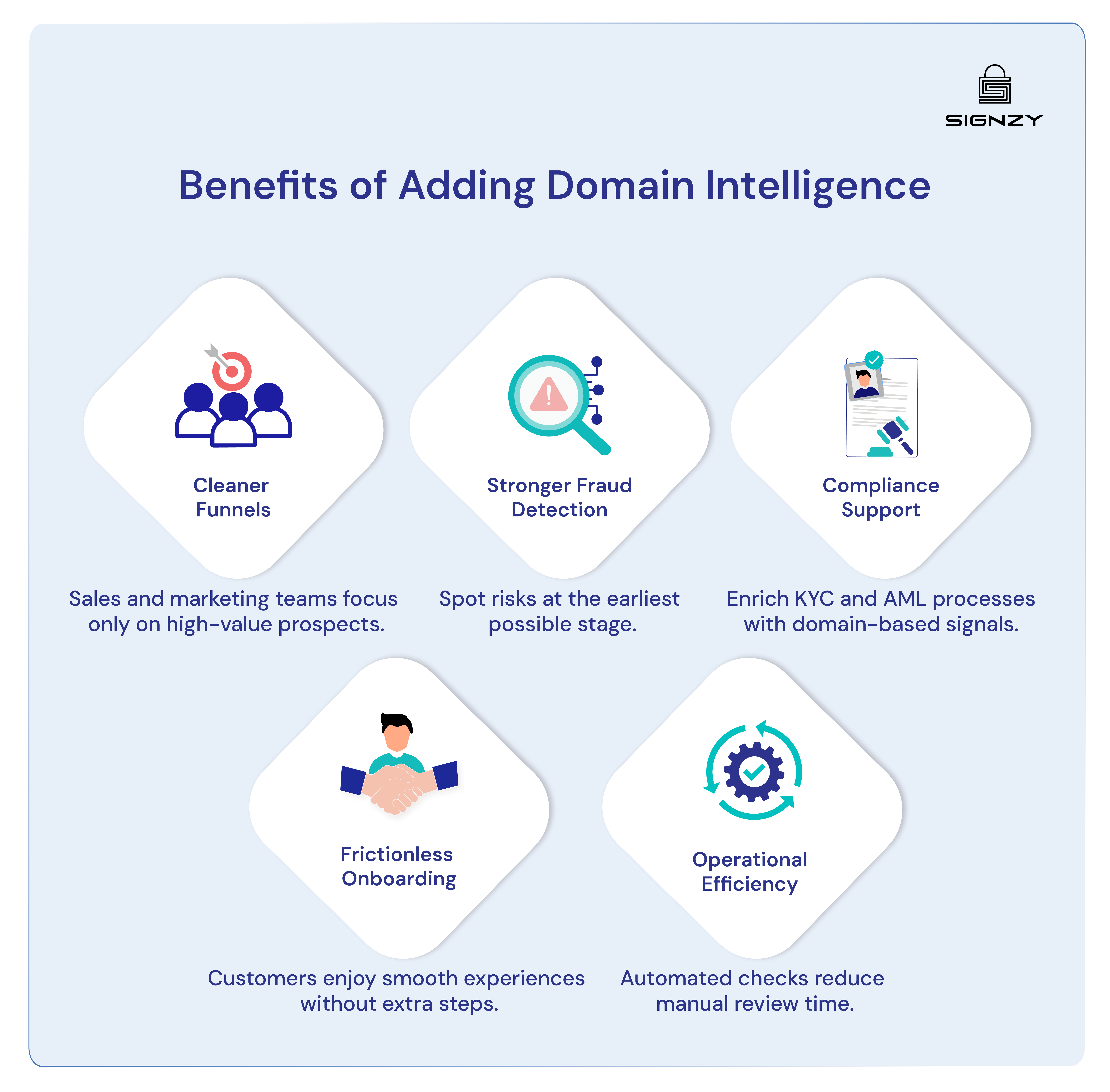How Domain Intelligence Strengthens Your Sales Funnel
Every lead starts the same way: someone types in an email. On the surface, it looks ordinary, but the part after the “@” holds more clues than most people realise.
That domain can hint at whether you’re dealing with a long-standing organisation, a brand-new throwaway account, or something that doesn’t quite add up. Sales and compliance teams that pick up on these details can focus on genuine prospects and eliminate the noise before it clogs the funnel. Behind each domain lies a set of hidden signals, age, region, and legitimacy that can help you separate high-value prospects from fraud risks.
Relying only on email syntax checks isn’t enough. Innovative businesses are now adding domain intelligence to their onboarding and sales workflows. This shift is especially critical for digital-first businesses, fintechs, SaaS platforms, and e-commerce firms, where fake signups, coupon abuse, and account fraud are common.
Related Solutions
Why Domains Matter in Sales Funnels
Think of it this way: if your funnel is a busy airport, domain intelligence is the immigration desk. Most travellers walk through with valid passports, but the system is designed to flag the suspicious ones early, before they step onto the plane.
1. Domain Age: The Timeline of Trust
Fraudsters often spin up brand-new domains to game signups, access free trials, or slip through compliance checks. Domain age provides a timeline of credibility:
- If a domain was registered yesterday, or even a couple of weeks ago, it’s often a throwaway, a favourite trick for fraud attempts.
- A domain that’s been around for months or a few years is usually safer, though you’d still want to keep an eye on it.
- And when you come across one that’s been active for five years or more, that’s usually a pretty strong signal that the address belongs to a stable user or company.
Example:
One SaaS firm running 14-day free trials kept seeing sign-ups that never converted. When they checked domain ages, the pattern jumped out; many were barely two weeks old. Classic fraud behaviour. After blocking those domains, fake trial accounts dropped by nearly 40% in just a month.
2. Domain Region: Where Is This Email From?
Domains carry region-based information that can uncover mismatches between customer claims and domain origins.
Regional alignment: User claims match the domain’s country of origin: Higher trust.
Unexpected region: Sometimes the details don’t line up. Imagine a customer who says they’re based in India, but the domain they’re using traces back to an offshore registrar with a reputation for shady traffic. That mismatch doesn’t prove fraud on its own, but it’s definitely a reason to take a closer look.
Example:
One fintech company noticed this pattern during onboarding. Several applicants claimed Indian residency, yet their email domains were registered in Eastern Europe. When the team looked closer, the pattern was too complex to ignore; several of those sign-ups turned out to be mule accounts designed for laundering. If the region signal hadn’t raised an early eyebrow, they would have slipped right into the system unnoticed.
Domain region signals don’t always mean rejection; they guide compliance teams toward more intelligent triage.
3. Domain Legitimacy: Real vs. Disposable
Not all domains are created equal. Some are disposable, some belong to parked websites, and some are linked to malicious activity.
- Corporate or ISP domains: Likely legitimate.
- Free webmail domains: Mixed, depends on context.
- Disposable or suspicious domains: Almost always risky.
Example:
An e-commerce platform was bleeding money from “new user” coupons. Fraudsters created multiple accounts with disposable emails. After integrating legitimacy checks, the company filtered out 95% of throwaway domains at signup. Coupon abuse dropped overnight.
Beyond Fraud: The Sales Funnel Payoff
Fraud detection is the apparent win. But domain intelligence also delivers sales and marketing benefits:
- Cleaner Data: Sales teams spend less time chasing junk leads.
- Better Conversion Rates: Quality leads = higher conversion.
- Accurate Metrics: No distortion from fake accounts inflating KPIs.
- Reduced CAC: Marketing spend isn’t wasted on invalid prospects.
Think of it as trimming the weeds before they choke your garden. A cleaner funnel means healthier growth.
How Domain Intelligence Fits Into Your Funnel
The best part? Domain checks are invisible to the end user. Customers never see extra steps or delays; everything happens in the background, in real time.
Integration points include:
- Signup pages – block fake accounts before they enter your funnel.
- Lead capture forms – validate domain quality for marketing campaigns.
- Onboarding workflows – compliance teams use signals for faster KYC/AML decisions.
- Ongoing monitoring – catch suspicious domain activity even after signup.
With APIs like Signzy’s, this is a plug-and-play, scalable, automated, and frictionless solution.
Benefits of Adding Domain Intelligence

- Cleaner Funnels – Sales and marketing teams focus only on high-value prospects.
- Stronger Fraud Detection – Spot risks at the earliest possible stage.
- Compliance Support – Enrich KYC and AML processes with domain-based signals.
- Frictionless Onboarding – Customers enjoy smooth experiences without extra steps.
- Operational Efficiency – Automated checks reduce manual review time.
Real-World Industries Using Domain Intelligence
- Fintechs: Screening signups for fraud before regulatory onboarding.
- SaaS: Protecting free trials and preventing multiple fake accounts.
- E-commerce: Blocking coupon abuse and account farming.
- Marketplaces: Reducing seller/buyer fraud with legitimacy checks.
- Banks: Supporting AML/KYC processes with domain-origin signals.
How Signzy Helps
Signzy’s Domain Verification API gives businesses real-time insight into an email domain’s age, region, and legitimacy. It’s designed to drop straight into your existing funnel or onboarding flow without slowing anything down.
Here’s what that looks like in practice:
- Instant checks – responses come back in milliseconds, so users never notice an extra step.
- Wide reach – the system pulls intelligence on domains across the globe, not just the obvious markets.
- Built to scale – whether you’re running a few thousand sign-ups a day or millions, the infrastructure doesn’t blink.
- Flexible use cases: Fraud prevention, compliance, sales optimisation.
Whether you’re a compliance officer flagging risky accounts or a sales leader aiming for cleaner leads, Signzy gives you actionable domain intelligence where it matters most at the very start of your funnel.
Fraud doesn’t just cost money; it corrodes trust. By adding domain age, region, and legitimacy signals into your funnel, you safeguard compliance, sharpen fraud detection, and give your sales team a healthier pipeline.
Smart sales start with smart signals. With Signzy's Domain Verification API, you get both.
FAQ
What exactly is domain intelligence?
Why should I care about domain age?
How do region signals help?
Can legitimate customers have new or free webmail domains?
How does this improve sales funnel performance?
Is integration complex?

Tanya Narayan
Tanya is a Product Marketing Manager at Signzy and a GrowthX Fellow, with a strong focus on SaaS and fintech. She specializes in go-to-market strategy, customer research, and positioning to help teams bring products to market effectively. She has also cleared the Company Secretary foundation level, reflecting her grounding in corporate and compliance fundamentals.







